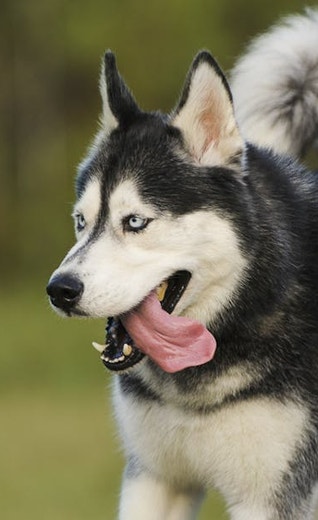
Foods Your Dog Should Not Eat
Outdoor activities like hiking, camping, and trail running with dogs are fun. But it’s important to keep a watchful eye on what your dog might lick, eat, drink, or roll in. From harmful foods dropped from the campsite table to toxic plants or mud puddles found along the trail, here’s a list of some things to watch out for from Dr. Jill Cline, Professional and Veterinary Engagement Manager for Eukanuba and Royal Canin.
TRAIL WATCH
Mushrooms: Some wild mushrooms may be toxic to dogs, so it’s best to keep your dog from eating them. "Certain toxins can destroy a dog’s liver and immune system,” Cline says. “Their recovery is difficult if not impossible. For example, the Amanita mushroom is among the most dangerous."
Milkweed: If you’re hiking with your dog around old farm fields, keep a vigilant eye out for milkweed. The plant contains galitoxin and cardiac glycosides which are poisonous if ingested. According to Cline, "signs include decreased heart rate, erratic heart beats, seizures, and collapse. Tremors followed by sudden death can occur if a dog has consumed a lot." If your dog happens to run through a patch of milkweed, thoroughly brush him immediately and remove any parts of the plant that may have clung to his skin and coat. This helps prevent ingestion of plant materials after your outdoor activities conclude.
Hitchhiker Seeds: Burdock, beggar's lice and cockleburs are common types of hitchhiker seeds that easily attach to your clothing and your dog’s fur. "A dog trying to remove the seeds from his coat can easily swallow them. When ingested, the seeds can become lodged in the throat or GI tract,” says Cline. To avoid ingestion, remove these hitchhiker seeds from your dog’s coat before he has a chance to do so himself.
Mud puddles: Don’t let your dog drink from a mud puddle. "Bacteria and protozoa found in standing mud puddles can cause Giardia and diarrhea," Cline said. "Run off from nearby fields may contain weed killer or fertilizer." Always carry fresh water for your dog and offer him a drink regularly during outside activities.
Saltwater: Don’t let your dog drink saltwater. "The salt in the water is a dehydrator, and drinking enough of it can shut down kidneys,” says Cline. Fresh water is key to keeping your dog safely hydrated, especially at the beach.
Watch out for rolling & licking: Consider your surroundings when enjoying your next outdoor adventure with your dog. If it is likely that fertilizer or pesticides may have been used in the area, Cline suggests rinsing your dog’s paws with some fresh water before he has a chance to lick and ingest any harmful residue. And if your dog happens to roll in a cow pie or a decayed animal carcass, wash him off completely before he has a chance to lick himself. You’ll help avoid sickness.
BREAK TIME & CAMP LIFE
Sports Drinks: Humans do well with drinks that contain electrolytes and sugar, but dogs just need fresh water. According to Cline, "Human electrolyte drinks were developed for athletes that became dehydrated through sweating. But dogs don’t sweat like humans, they cool off by panting. Drinks that contain sugar are difficult for dogs to digest. That digestion requires water, so giving dogs a sports drink actually dehydrates them even more."
Alcohol: Dogs shouldn’t lick spilled beer or wine and should never be offered a sip of any alcoholic beverage. According to Cline, "alcohol is a dehydrator as it pulls water away from a dog’s tissues. But of greater importance is that dogs don't have the enzymes necessary to break-down alcohol. Any amount of alcohol can send your best friend into toxic shock."
Garlic & Onions: When preparing meals at a campsite, avoid dropping ingredients on the ground like garlic or onions. "Garlic is poisonous to dogs, but the effect may not be seen for several days," says Cline. "Signs include lethargy, weakness, vomiting, an elevated heart and respiratory rate, and even collapse. And the toxin in an onion creates a hemolytic anemia that can impact or destroy a pup's red blood cells. Low red blood cells make dogs susceptible to illness, and while they're not as dangerous as some human foods they should be avoided."
Chocolate: "If a dog has a small amount of chocolate they'll probably suffer from an upset stomach followed by diarrhea," Cline said. "But if they chow down on the double-layer cake on the picnic table they could suffer from muscle tremors, seizures, internal bleeding, or have a heart attack. Theobromine poisoning is the cause, with hyperactivity followed by seizures being the result."




